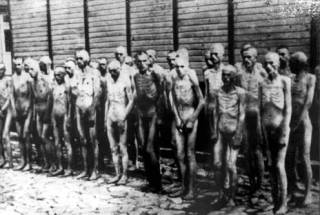It’s hard to think of where to begin with a discussion of Alain Resnais’ incredibly powerful Night and Fog (1955). Is it appropriate to recommend a film that operates on such a seminal level that it transcends cinematic experience and filmic consumption, to instead become an artistic document that should be witnessed by all, not least to attempt to extend memory of the greatest atrocity of the Twentieth Century, the Holocaust?
What Resnais accomplished in the half hour’s screen time that Night and Fog runs for is to accumulate a vast collection of photographs, images of detrimental artefacts, and present-day (1955) first-hand footage shot by Resnais himself. This revolves around several of the concentration camps created and utilized by the Nazi forces in the Second World War, attempting to offer a glimpse at the unimaginable experiences of the prisoners, mostly the Jewish population of Europe, forced there.
Made but ten years after the German surrender to the Allied forces, the film is an organised compilation, haunting both in its initially showing the dereliction of the infamous Auschwitz- ultimately still foreboding- and less well-known, Majdanek concentration camps, and its devastating ability to accentuate images of people on the verge of death, or who were fortunate to submit to it.
More often than not, the film refuses to intrude on certain locations, and as such, this camera is omnipotent yet humbled, as exclaimed by its narrator in an inability to change the past or find explanation for inexcusable events.
It’s hard to explain at what level the film effects. In lesser hands it could have been little more than an installation in an art gallery or museum, but Resnais is imbued with a quality that acts like an unobtrusive guiding hand, but, distinctly individual.
 In a portfolio containing such master works as Hiroshima Mon Amour (1959) and Last Year in Marienbad (1961), Night and Fog is his arguable epitaph- a film that transcends his oeuvre and should stand up as an article of the century. Equal credit must be attributed to writer Jean Cayrol, a Holocaust survivor, with the poignancy and equal biting of the words inflected by narrator Bouquet, ensuring we are never the passive viewer.
In a portfolio containing such master works as Hiroshima Mon Amour (1959) and Last Year in Marienbad (1961), Night and Fog is his arguable epitaph- a film that transcends his oeuvre and should stand up as an article of the century. Equal credit must be attributed to writer Jean Cayrol, a Holocaust survivor, with the poignancy and equal biting of the words inflected by narrator Bouquet, ensuring we are never the passive viewer.
One must also reflect the sheer importance of the context the film was made in. For a product of the late twentieth or even early twenty-first century’s such is the manner the events regarding the Second World War are continually dictated that one effect can often be a sort of desensitisation. Night and Fog remedies this. In the mid-fifties, however, the document is even more important, a film slightly longer than a short film that came under increasing censorship despite its humanistic intention to depict the most inhuman of acts. Some brief research sees it as the only documentary film about the Holocaust in the 1950s – before one imagines they tried to suppress memory, after they were probably scared of an inability to match this film’s majesty.
Like Buñuel, Resnais does not attempt to reason good and evil; a humbling that accentuates their own qualities. Where Resnais’ eminence lies truly in this instance however is within the balance between archival photograph and footage and the poignancy offered in the intercepting present-day footage; in one instance, a subject stares straight into the camera breaking the rhythm of the film, shockingly piercing the fourth wall and tearing into the soul and into memory, a multitude of emotion instilled in a single photographic image.
Night and Fog acts as a dream, more rather, a nightmare, seemingly captured from the vast memory of survivors and, indeed, victims whose voices are forever suppressed. The objective of film criticism is to reason to an audience whether to watch a film or not. What is assumed from Night and Fog is that some things are beyond reason, and this is precisely why it must be seen. Resnais made a film that went beyond the boundaries of cinema criticism. Instead, it has become a humanitarian plea, to watch, listen, and experience, to invigorate memory and keep our eyes and ears truly open.


